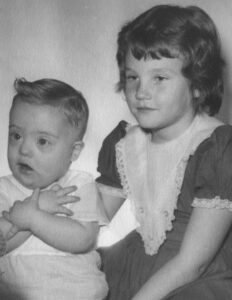
Have you ever considered writing your memoir?
Everyone has a story; it could be a documented collection of your memories for your children and grandchildren. It can preserve the family’s legacy, help you gain insight into your past, and even help you heal from a traumatic experience. Writing has been cathartic for me, a form of self-therapy and discovery.
Twenty years ago, after my mother died and my brother came to live with me, I needed an outlet for decades of suppressed emotional baggage. Formal counseling was never a comfortable option for me, but journal writing had been my go-to panacea for releasing complicated feelings. I signed up for a creative writing class in Scottsdale, AZ, and my first submission evolved into the first chapter of my memoir. It’s been revised several times, but the tone and details remain the same.
I didn’t decide to write an entire book until I took another writing class in Florida last year. Susie Baxter who wrote and taught “Write Your Memoir: One Story at a Time,” inspired me to finish what I had started twenty years ago. I joined the Writers Alliance of Gainesville (WAG), and the critique pod we formed helped keep me accountable and focused on writing weekly. And by the end of September, my manuscript was completed.
I can’t tell you what a liberating feeling it is… to have written a memoir that will soon be published. But exposing my truth and dark secrets makes me feel incredibly vulnerable and insecure. “What if I get negative reviews?” But I remind myself every day that I wrote this for myself as much as for others. Maybe it will resonate with someone and give them hope in their own personal struggles. Reading and journal writing were my life preservers when I was drowning in dark despair. I found solace in many books that gave me hope to find purpose.
My thoughts on writing: Just start! A class or a writing group can be beneficial for writing your memoir. A critique writing group can be invaluable for giving you constructive feedback and positive validation. The writers in my pod were strangers at first but have become my dear friends as we shared stories that hadn’t been divulged to our family or long-term friends.

A memoir isn’t meant to be your entire life but a particular part of your life, perhaps about a personal struggle or a period of transformative experiences. Mine is the story of growing up with my brother with Down syndrome, our family tragedies, and my commitment to him during my lifetime.
Once I decided to finish my memoir and committed to the bimonthly pod submissions, the writing came effortlessly. My dreams were flooded with memories, and I would start writing as soon as I awoke.
The critique pod gave me helpful feedback and critiques, but I still hired a developmental editor who improved the sentence structure flow without changing my voice.
Writing my memoir has been one of the most challenging yet rewarding experiences of my life. It’s not just about putting words on paper—it’s about reliving the emotions, processing them, and finding the right way to share my truth. Here are a few lessons I’ve learned along the way:
1. Healing Through Reflection
Writing about my experiences, particularly with my brother and my mentally ill mother, brought up a whirlwind of emotions. But I was writing to heal parts of myself. Reflecting on my past allowed me to make peace with the hardships and find new meaning in the challenges I faced.
2. Vulnerability is Strength
It’s not easy to open up and share intimate details of your life. There were many moments when I wondered, “Should I really share this?” But I learned that vulnerability can be empowering. By sharing my raw truth, I found strength not just in myself, but in connecting with others who might have similar stories.
3. It’s Okay to Leave Things Out
One of the biggest challenges I faced was deciding what to include and what to leave out. I made the conscious decision not to focus on my children’s lives in this memoir. While they are a significant part of my journey, I wanted this book to be about my own personal experience with caregiving and my family. Not every detail of your life needs to be shared—it’s okay to create boundaries, even in your own story. I’ve also learned that it’s best to write in scenes and omit information your reader doesn’t really need.
4. Resilience is a Lifelong Lesson
My grandfather’s advice—“play the cards you’re dealt to the best of your ability”—has been a guiding light throughout my life. Writing about the trials and triumphs of my journey, especially after losing my father at fifteen, reminded me how resilient I’ve had to be. This process showed me that resilience is not just about surviving, but about thriving despite the odds.
5. Connection Through Storytelling
The most fulfilling part of this journey has been hearing from people who resonate with my story. Whether it’s other caregivers, people who grew up in difficult circumstances, or those supporting marginalized communities, the connections I’ve made through my writing have reinforced how powerful storytelling can be. We all have stories to tell, and through sharing them, we can find healing, strength, and connection.
I challenge you to find the courage to begin!

Michelle Dunlap
So inspiring! Thank you for the advice you have offered for those writing biographical or autobiographical material. Your practical insights and authenticity will serve writers well, and we appreciate these helpful reflections!
Debbie Miller
Thanks, Michele, for your kind words. Our writing pod was the inspiration I needed!
Andy Adkins
Excellent, Debbie. A lot of valuable and insightful tips. Thanks for sharing your story. I look forward to reading it.
Susie Baxter
Although I have already read a number of chapters in Debbie’s manuscript for Raising Ricky, I can hardly wait to get my hands on a copy of the bound book. I’ll be looking for her at the Sunshine State Book Festival on February 1! Way to go, Debbie!
Debbie
It wouldn’t have been possible without your book and class. Thanks Susie!
Debbie Miller
Thanks, Andy. I look forward to reading yours as well.
Sara Dagen
Such an encouraging post, Debbie! I took Susie’s class this past October and plan to join WAG (and a critique pod) to start and finish my first book. Congratulations on Raising Ricky!
Debbie Miller
Thanks, Sara. You won’t regret it. Check with Susie, we may have a spot for you in our pod. I would not have finished my manuscript without it.
SARA DAGEN
Thanks! I will. I’d love to be a part of it.